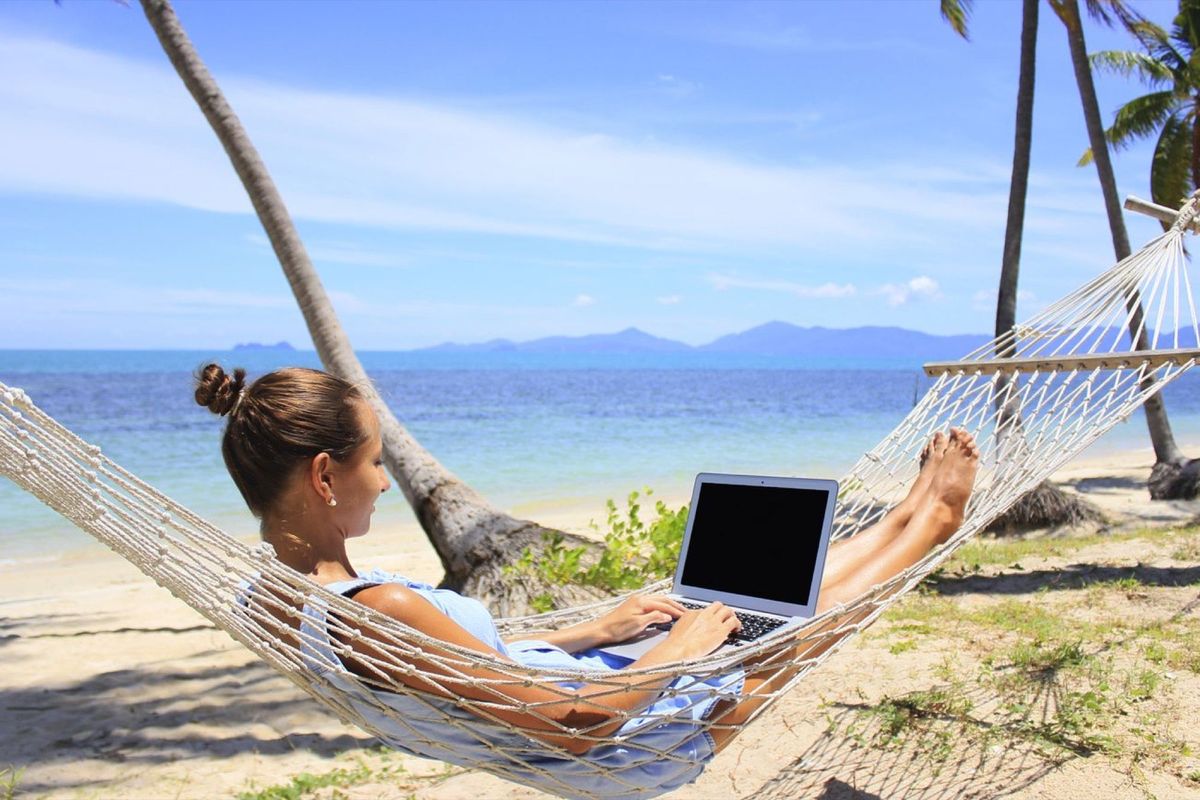How to Survive as a Digital Nomad

A few minutes every morning is all you need.
Stay up to date on the world's Headlines and Human Stories. It's fun, it's factual, it's fluff-free.
[spu popup="4222″]Click Here for a Quick Summary! [/spu]
At first glance, digital nomads may look like they have the dream job. They travel around the world and work remotely from a beach, plane, or alpine resort with the help of digital tools. They’re never stuck with the 9 – 5, which allows them to visit exotic places and experience new things every day.
According to recent research by Upwork, over 57 million people worked as freelancers in 2017. Since 2014, the freelance workforce grew at a rate three times faster than the general US workforce overall. At this rate, the majority of the American workforce is forecast to be freelancers by 2027.
A 2018 report from FlexJob identified digital nomads as professionals who work fully-remote jobs and move locations frequently. According to the survey, the “job” is appealing because of the flexible schedule (85%); no commuting (65%); freedom to live and work where they choose (65%), good work-life balance (63%); no office politics (52%); and no dressing up for work (51%).
These were the “pros” I had in mind when I first started working as a digital nomad three years ago. I soon found out that there’s no such thing as a dream job and that being a digital nomad (as with any other job) comes with its own set of challenges.
If you are hoping to become a digital nomad, here are a few survival tips:
Finding work as a digital nomad
Many jobs can be done remotely, such as web and app development, writing, editing, translation, design, accounting, consulting, etc. If you’re interested in becoming a digital nomad, you need to know whether your area of expertise is suitable for remote working. FlexJob reported that 35% of digital nomads are employed by a company, while 28% are digital nomad freelancers, and 18% are business owners.
If you’re employed by a company, you don’t have to worry about finding new projects. However, finding work is a constant challenge for freelance digital nomads, myself included. Because we don’t enjoy a stable income stream every month, we’re constantly looking out for new projects and juggling several projects at the same time.
My best tip for maintaining a healthy income stream is to develop and grow relationships with a few retaining clients. These can be clients that pay well, are pleasant to work with, or offer an on-going project that you enjoy. If you’re able to maintain a few consistent projects, you can do what you love while not worrying too much about where to find your next contract.
If you’re starting as a digital nomad, you can establish these relationships by asking around in your network (or even your existing employer) whether they would like your freelance services. Branching out on freelancing platforms such as Upwork or Freelancer is also a great way to find new clients.
The amount of work may seem scarce when you first get started, and you may feel obliged to accept whatever project lands in front of you, regardless if it is time-consuming, don’t pay that well, or aren’t very interesting.
My advice for avoiding mind-numbing projects that don’t pay enough, which I learned from prominent YouTuber bestdressed, is to know your worth. She suggests that you set an hourly rate (or a range) that you find acceptable for your skills and time. If the project pays below your minimum hourly rate, don’t take it. Other projects will greet you in no time.
[article_ad]
Insurance, taxes, and other adult problems
Money and budgeting
Getting paid per project means that it will be impossible to anticipate a stable income for your budget. My best tip for this is to have a goal income in mind – a minimum amount you hope to make each month to sustain your life and travels. Establishing this goal will help you budget for spending and saving, as well as guide you on which project to accept or reject.
The NYTimes also advise you to be aware of unexpected fees before you travel. Research your bank’s policies on overseas transactions and their associated fees to make sure that you’re not wasting money on these costs.
Maintain a physical address
Even if you’re traveling the world, you still need a home address for mail, bills, banking, and employer records, says the NYTimes. If you don’t have one, you can register for a physical mailing address with services like Traveling Mailbox or Earth Class Mail, which forward mail to your destination.
However, aim to keep physical mail to a minimum by signing up for paperless statements, direct deposits for payments, and online bill payment.
Insurance
Before you travel, you should check your health insurance to see their policies and coverage abroad. If your current insurance carrier offers international coverage, you can sign up to get more benefits. I don’t recommend getting travel insurance since it can be costly and only cover a short time. You also have the option of signing up with expat insurance providers such as Aetna International and Cigna Global to cover you while you’re working abroad.
Taxes
Tax is a complicated matter, and when you don’t maintain a physical address or have an employer, figuring out your tax obligations can be tricky. If you want to stay out of trouble and maximize tax benefit, my recommendation would be to hire a professional to handle your taxes. You can use the IRS Tax Preparer Directory to find a tax consultant to help.
Maintaining a healthy lifestyle as a digital nomad
Have “office hours”
Digital nomad work can be liberating, but it can also be extremely demanding. Some clients can expect you to be available and respond at all hours of the day. The blurred line between work and fun, (i.e. working in a coffee shop in Bali) also means that you cannot completely unplug when you enjoy life. When I first got started as a digital nomad, I always felt guilty during my leisure time because I knew that tasks and projects were waiting for me. That affected how much I was able to enjoy my leisure time.
It may sound odd to have office hours if you don’t work in an office, but you should designate a block of time each day to be online and focus 100% on work. Outside these hours, you can completely unplug and spend time on some other leisure activities. Setting boundaries for when work stops and when life starts allows you to maintain a healthy relationship with both. You may communicate this with your clients so that they can respect your boundaries as well.
Manage your workload
Hustling for new projects and juggling several others at once requires a superhuman amount of organization and coordination. I find that putting everything in my Google Calendar (yes, even scheduled sleep or leisure) can help me manage my time. I also keep a journal to write down everything I need to accomplish each week so that I never have to keep a mental note (which is exhausting) or miss a task.
There are great, free workload management tools that can help you get your life in order like Google Drive for storage, Asana or ClickUp for tasks management, Slack for team communication, and Zoom for video communication.
Adjust your work/life balance when you feel burnt out
Burnout from the digital nomad lifestyle is real. The ExpertVagabond blog shares that the nomad lifestyle can be exhausting, unproductive, and lonely. On the road, it’s challenging to maintain a routine, work on personal development, experience the local culture, maintain healthy relationships, and work on interesting projects. It can feel overwhelming to do all these things and, at the same time, feel like you’re not doing enough of anything.
Digital nomads need work/life balance too, and we have the luxury of dialing down work when life demands or slow down our travel to take up an exciting project. Many nomads give similar advice on the Nomad List forum – don’t feel guilty if you’re not working enough when you travel, or not traveling enough when you focus on work. As a digital nomad, I find that this awareness helps me adjust my work/life balance so I can enjoy both, but not at the same time.
Additionally, digital nomad life can be incredibly lonely, especially if you’re traveling alone. Aside from work and travel, you should also spend time making meaningful connections with the locals or catching up with friends back home, advised the digital nomad blog ScrewTheAverage. I find that participating in community events, volunteering, joining online communities like Reddit, or just going out can be great ways to connect with people. If needed, there are online counselors available on platforms like BetterHelp or TalkSpace to help you work through problems, even while you’re on the road.
[article_ad]




Comments ()